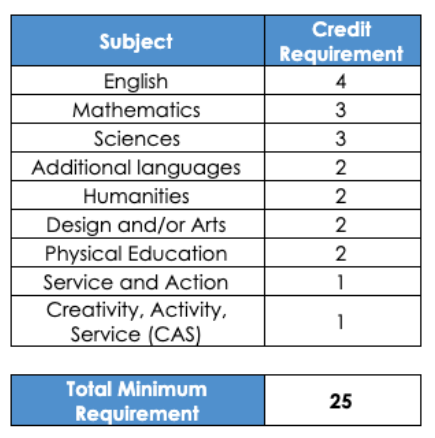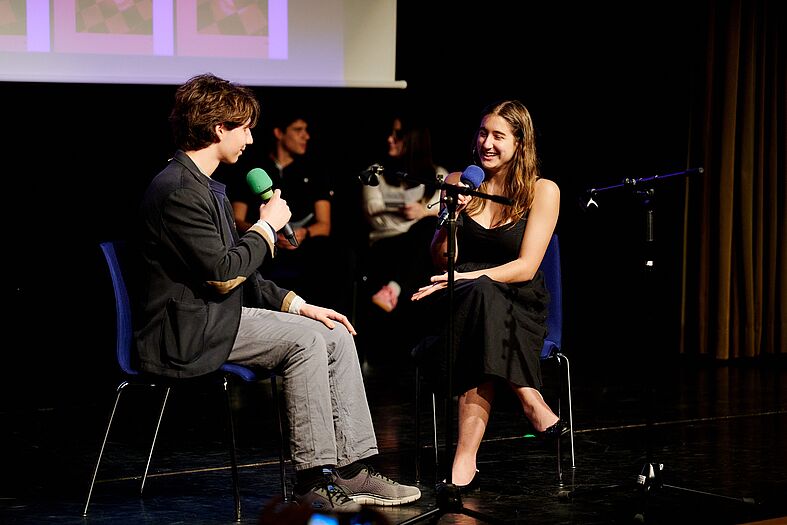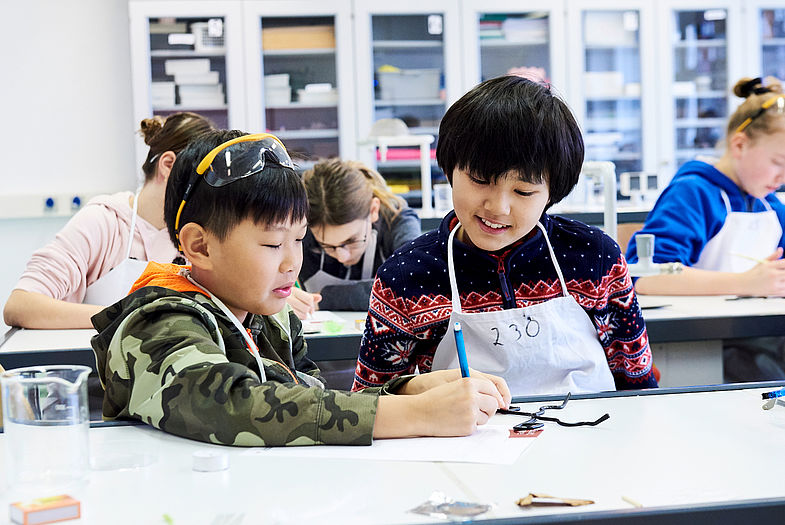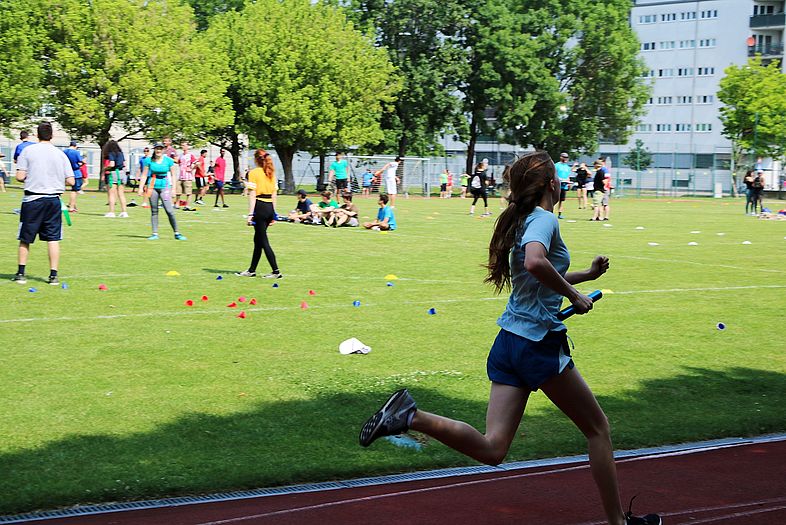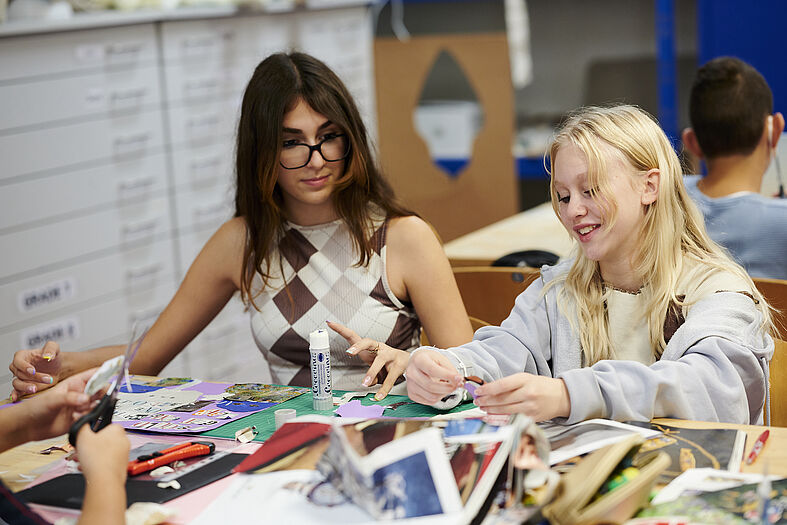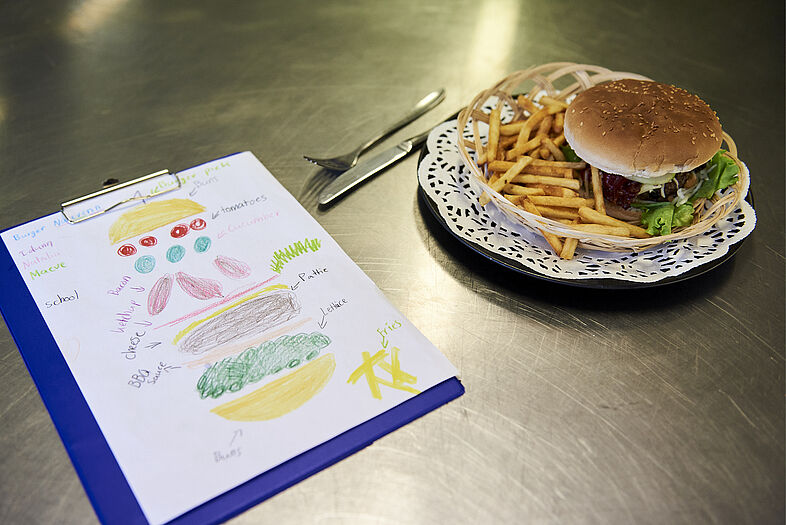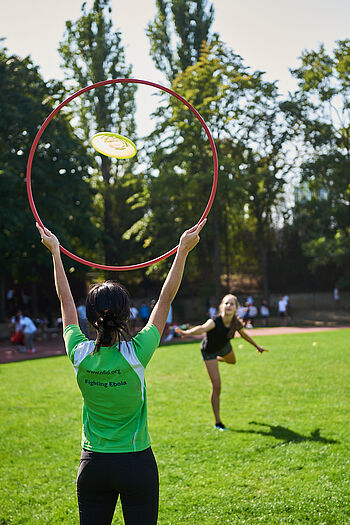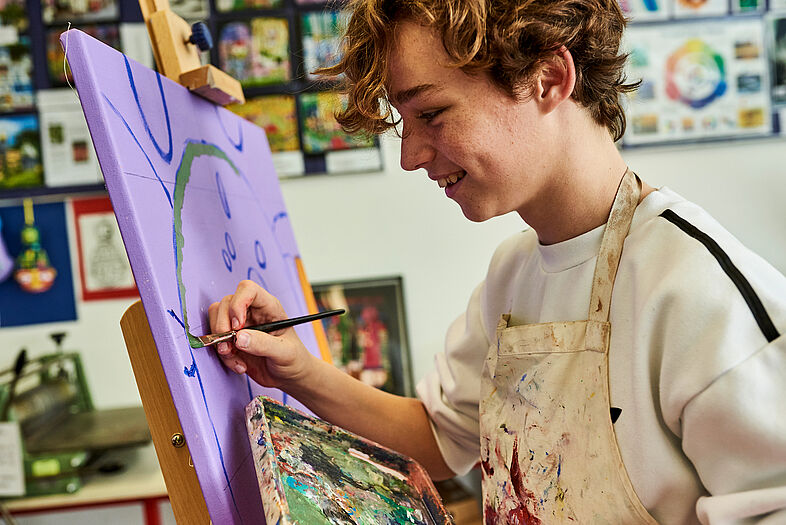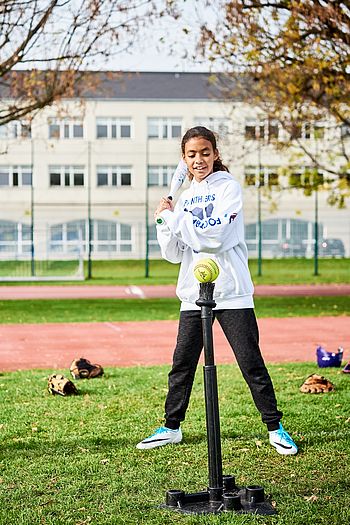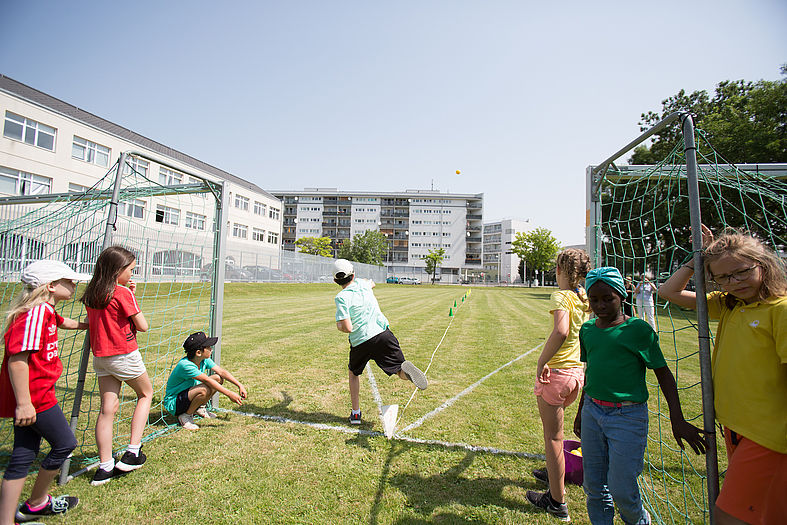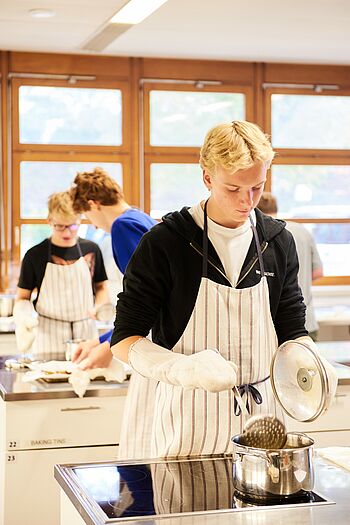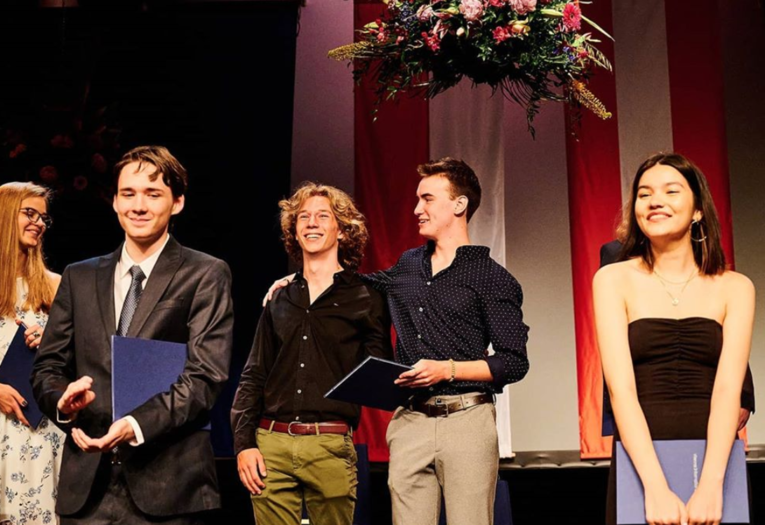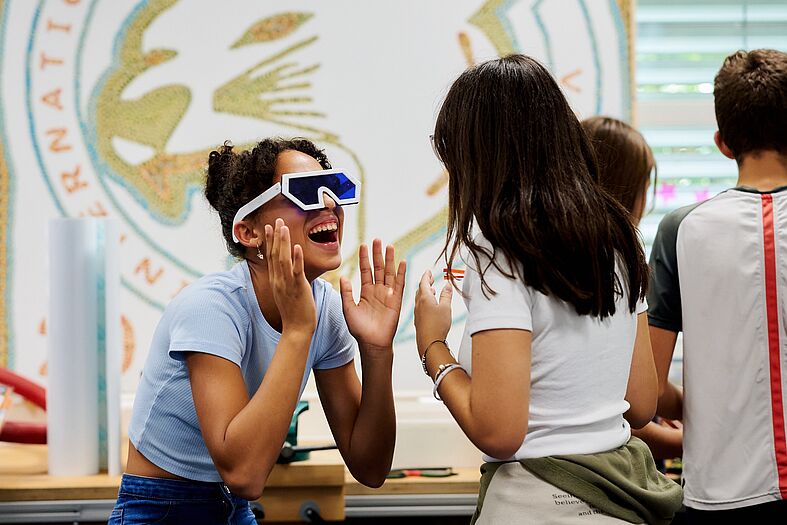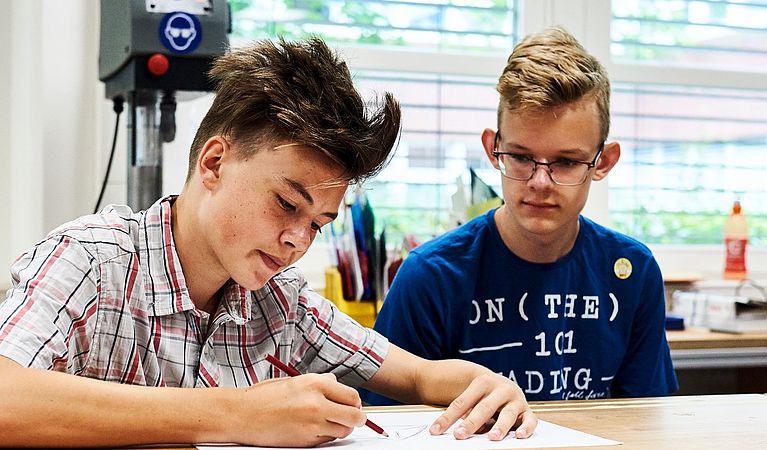
Secondary School
Welcome to the Secondary School
A very warm welcome to the Secondary School. In the Secondary School we take great pride in welcoming all students into our learning community and encourage students to strive to reach their potential. We hope to achieve this by providing a caring and nurturing environment where all students can be a unique and valued member of the school.
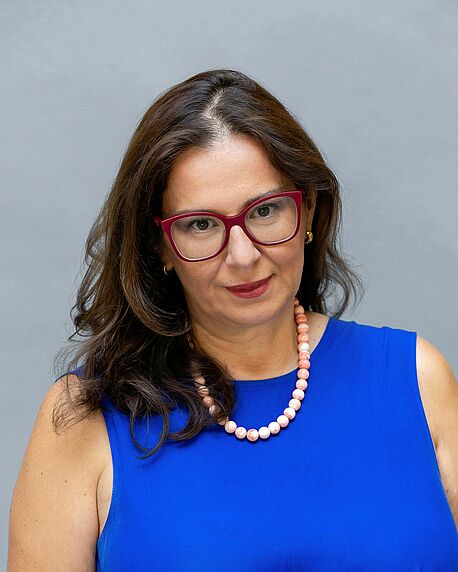
Against this secure backdrop, we encourage our students to work hard to achieve their academic potential. The International Baccalaureate Middle Years Programme (IBMYP; Grades 6-10) and the International Baccalaureate Diploma Programme (IBDP Grades 11-12) provides us with a curricular framework from which to build, our students’ knowledge, abilities and interests.
We aim for our students to embrace learning and understand that their time spent at Vienna International School is a part of their life long journey of learning.
We are also driven ensuring the holistic development of all our students. The School has an extensive extra-curricular programme that encompasses sports; music; mathematics competitions; Model United Nations; student publications and the Duke of Edinburgh’s International Award (to name but a few).
We encourage all students to find something they are passionate about and get involved.
All our students participate in Service and Action projects. It is central to the values of VIS that every student should contribute to better the world. This includes projects that improve the lives of others, the environment and society as a whole. We aim to educate ethically driven, contributing members of our global community who are empowered to be positive drivers of change in the world.
We know that if the relationship between the home and the school is strong we can successfully work to support students in achieving personal success. We therefore engage parents as partners in the learning journeys of our students and expect that our parents will support the values of the school and its approach to learning, student success and well-being.
Warm Regards
Marija Vuckovic-Trajic
Secondary School Principal
The Vienna International School prides itself on a very strong and successful arts programme. From music to visual and performing arts, the students have the ability to immerse themselves in the genre that best suits their talent. With highly qualified and dedicated artists and musicians as teachers, the students are able to develop and hone their skills, which allows them express themselves as confident and competent artists. We offer a complete programme starting in the Primary School and progressing through to IB Visual Arts in the Secondary school. Art students develop the following understandings in the four strands of visual art:
- Creative processes
- Elements and principles of art and design
- Reflection and appreciation
- Visual art in society
VIS was the first school in Europe to pilot the IB Diploma Film course in 2001, which has since become an established subject in both the MYP and IB Diploma programmes. As a modern art form, film emphasises the importance of visual imagery, technology, and communication. Film is currently available to G9-G12.
In Grades 6 to 8, Design is a main subject in the MYP that allows students to engage in solving problems in design contexts. The five strands we offer these learning opportunities are: product design, programming, graphic design, electronics and food design. The program assists students to develop skills in the areas of investigating problems, designing creative solutions, planning, creating and evaluating. Design is the link between innovation and creativity, allowing the learner to engage with shaping the real world. Design is human-centred and focuses on the needs, wants and limitations of the end user.
MYP design courses help specifically to prepare students for the study of computer science (CS), design technology (DT) and information technology in a global society (ITGS) in the Diploma Programme (DP).
The Physical Education department uses sports and activities as a tool to help every student to become responsible and guide each individual to achieve their own potential and reach success, in any aspect of society. Therefore, PE at VIS is geared to develop three domains: the psychomotor (physical development), cognitive (thinking, reflecting skills) and affective domain (emotions, feelings, attitudes, behaviour). We offer a range of sports and activities to provide students with a contemporary and holistic education. Moreover, all lessons are inquiry-based and are students centred. We offer a range of sports and activities and teach them in clusters: Striking & fielding (e.g. Softball, cricket), Invasion games (e.g. Ultimate frisbee), Racket/net games (e.g. Badminton/volleyball), creative movement (dance, parkour), and Track & field.
Science is taught with a high level of hands-on practical work aimed at making the subjects both relevant and exciting. We have seven well-equipped laboratories that are fully able to manage the demands of practical science work. The Science Department also makes good use of the surrounding environment offering local excursions to museums and field trips to enhance the classroom experiences for students. In grades 6 – 10 we offer the IBO Middle Years Program following the modular science model. In grades 11-12 we offer the IBO Diploma program in Biology, Chemistry, Physics and the interdisciplinary science course “Environmental Systems and Societies”. Students participate in local and international science initiatives such as the “Science and Engineering Fair” organized by the UN IAEA.
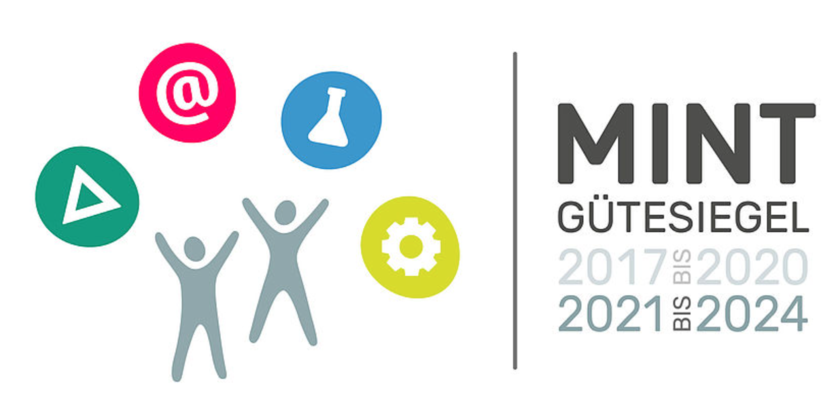
Students are taught mathematics with an emphasis on discovering and applying knowledge and skills in real life contexts. In addition to textbooks, they learn using a wide variety of resources, including departmental sites subscriptions, manipulable materials and ICT tools.
In G6-G10, our courses were designed to address all the topics included in the International Baccalaureate Middle Years Programme framework: Number, Algebra, Geometry and Trigonometry, Statistics and Probability, and Discrete mathematics.
In G6-G8, students follow the same common course that leads naturally to the standard mathematics course in G9-G10. For those students who have demonstrated higher capability and results they have the opportunity to join the extended mathematics course in G9-G10. This course contains additional content and the standard level topics are explored at an higher level
of sophistication and abstraction.
Students in G11-G12 study one of the following courses from the International Baccalaureate Diploma Programme: Mathematics Analysis and Approaches and Applications and Interpretations at either standard or higher level. There is also the opportunity for students to undertake a high school mathematics course (non IB) such as Introduction to Statistics.
Languages
The Romance Language Department at VIS offers French and Spanish to all secondary students who are not enrolled in the ELA programme.
- In Grade 6, the school only offers French and Spanish at the beginner level thus students with a previous knowledge of French will only have Spanish as an option, and vice versa.
- In Grades 7 and 8, Spanish and French classes are available to beginners and to those with a basic knowledge of the language.
- Students joining the school in Grades 9 or 10 should have studied French or Spanish for two to three years to be accepted in the Romance Language programme.
The student’s level of proficiency in the language will be assessed by the Romance Language Department before making the decision on a student’s placement in the programme.
Please note, the school does not offer French or Spanish courses for mother tongue speakers or highly advanced speakers of the language (above Phase 4 in the MYP programme) within the regular timetable. Mother Tongue classes in French and Spanish are available at our school and are taught outside school hours.
Our curriculum aims to construct learning around relevant and authentic situations and develops the following skills: listening, reading, speaking, and writing. From G6-G10, we work under the MYP framework, which aims to instil a respect for, and understanding of, other languages and cultures. In G11 and G12, we follow the curriculum of the DP programme (at both Standard and High Level), based around five themes: identities, experiences, human ingenuity, social organization and sharing the planet. G11 language students go to either Madrid or Paris for a week in April, organized by the school to experience their learning in real life context and to expand their cultural understanding of the language.
As the language of the host country, German is taught to all secondary students at VIS. We offer courses at all achievement levels in each grade. Our teachers are all native speakers who teach with enthusiasm and passion. Excursions and field trips add to the authentic approach of the teaching and expand the cultural experience of learning German.
VIS was a pioneer amongst international schools in recognizing the importance of additive bilingualism - that is, the continuing development of our students' home languages while at the same time learning the school language of English. A large number of research studies show very clearly that bilingualism can increase children’s language abilities and help their progress in school.
Both the Primary and Secondary schools at VIS are truly international in that the majority of our students speak a language other than English as their first language.
Grade 11 and Grade 12 students have the possibility to take their Mother Tongue as one of their International Baccalaureate (IB) Diploma subjects. Approximately 30% of all IB Diploma level students each year take this option. Please contact the IB office or the IB DP Mother Tongue Coordinator for further information: dpmothertongue(at)vis.ac.at.
In line with the IBO philosophy, all VIS teachers are language teachers just as all VIS students are language learners. We are committed to creating a learning community that promotes and supports language development while fostering confidence and creativity in a way that values all students' cultural identity and sense of self— recognizing the unique knowledge and experiences that each student contributes to our shared learning community. We recognize that language learning is "a developmental process where there are opportunities for students to build on prior knowledge and skills in order to help them progress to the next phase of language development" (Language and learning in IB programmes, 2011, p.17).
VIS MYP English Programme
VIS is also committed to ensuring that our English language learners enter the IB Diploma Programme equipped with the academic language necessary for success; therefore, VIS’s MYP English program provides students with different entry points depending upon where students are in their language development from beginner to native speaker. For language learners, these entry points align with the MYP’s six phases of language development, which represent a continuum of language learning as students work toward native proficiency. The phases do not correspond to particular age groups or MYP years/grades but rather reflect where a student falls on a developmental continuum.
MYP Language Acquisition
The primary aim of VIS’s MYP English Language Acquisition course is to support non-native English speaking students in gaining competence in English with the long-term goal of successful engagement in rigorous English-medium academic coursework. To this end, language learners who do not yet have the level of English proficiency needed to fully participate in the Language and Literature curriculum and other core content disciplines are placed in a Language Acquisition course and provided with specific strategies and interventions aimed at increasing linguistic proficiency across the modalities of listening, speaking, reading, and writing in a variety of academic contexts.
MYP Language and Literature
The primary aim of VIS’s MYP Language and Literature course is to enable students to continue to develop the critical and creative thinking skills necessary to study and analyze both literary and non- literary texts and to apply these concepts and skills as they produce a variety of authentic texts. In this course, students will have the opportunity to apply linguistic skills as they engage with texts from a variety of cultures and historical periods. Students will use language as a "vehicle for thought, creativity, reflection, learning, self-expression, analysis, and social interaction" which will equip students with the linguistic skills needed “to develop interdisciplinary understanding across all other subject areas.” (MYP Language and Literature guide, 2014, p.4) English language learners are supported in accessing grade-level curriculum through the use of scaffolded instructional techniques, including the use of appropriately leveled texts.
Entry and Placement in MYP English
As students are admitted to VIS on a rolling basis throughout the year, placement for new students is informed by a combination of a student’s language profile, interviews, standardized assessments and previous school records, which help identify the entry point best suited for each individual student.
Students who apply to VIS for Grades 6-8 will be asked to take a language placement test following an offer of admission. Both the NWEA MAP Reading screener and an on-demand writing sample will inform placement within our mainstream or English language acquisition programmes.
Students who apply for admission into Grades 9-12 will be asked to take the NWEA MAP Reading screener and may be asked to submit an on-demand writing sample prior to admission to determine whether the student’s English language proficiency supports access to VIS’s academic programme.
Movement within the MYP
All students placed within English Language Acquisition will be eligible for consideration for phase promotion by their teacher at the end of each term. Movement or advancement within language courses relies on grades and supporting evidence of student learning and progress. Students will be eligible to advance into the next phase level class via a combination of academic language assessments, MYP Phase criteria, writing samples, and formative assessment. Through collaboration and consultation with the nominating teacher, relevant department leaders and the secondary school administration review data and work samples to make a final determination on movement or advancement.
Humanities
Individuals and Societies
Individuals and Societies at VIS incorporates a wide range of Humanities disciplines starting from integrated inquiry-based Humanities courses in Grades 6 to 8, and then transitioning through to more in depth discrete History and Geography semester courses in Grades 9 to 10, taught by specialist teachers. The Grades 6 - 10 courses follow the IB MYP curriculum framework and are designed to equip students with the necessary knowledge and skills to inquire into the historical, contemporary, geographical, economic, and cultural factors which shape our societies and our environment. The courses are designed to train students to become critical thinkers about topical issues on global and local scales, thus enabling them to be informed future global citizens and decision makers. The department supports experiential learning and organises different fieldwork investigations and outdoor learning excursions in both local and international environments.
The Grade 6 - 8 Individual and Societies Course is an integrated year long course focusing on a range of topics including: How Maps help us explore Time, Place and Space, Early Humans, Ancient Civilisations, Settlements, our Community in a Global World, the Middle East: Past and Present, Life in the Middle Ages, Innovation and the Renaissance, How Globalisation shapes our Community, Global Development, Global Organisations - The United Nations, Equal Rights Movements, Climate Change. The focus is on building research, communication and critical thinking skills which can be applied to all Individual and Societies courses later on. In Grade 9 and 10 each student follows a semester course in both History and Geography each year. Some of the topics investigated include: Revolutions, Global Migrations, 20th Century Turmoil and Globalisation.
In Grades 11 and 12, the Group 3 Diploma Programme choices include, History, Geography, Psychology and Economics - all offered at either Standard or Higher Level. There are no prerequisite entrance requirements for any of these courses.
DP Economics uses scientific methodologies which include quantitative and qualitative elements. The course emphasizes the economic theories of microeconomics, which deal with economic variables affecting individuals, firms and markets, and the economic theories of macroeconomics, which deal with economic variables affecting countries, governments, and societies. These economic theories are to be applied to real-world issues.
DP History is focussed on Modern European History and is based on a comparative, multi-perspective approach to history focused on the key historical concepts of change, causation and significance. The topics studied include: the causes of the Second World War, and single party rulers including Hitler, Stalin, Mao and Mussolini.
The aim of the DP Geography course is to empower students to understand the world around them by exploring physical, human and political Geography with a strong focus on current environmental, developmental and political (globalisation) issues.
In DP Psychology, students study the “core” of biological, cognitive, and sociocultural psychology. Students can expect to develop an understanding of how psychological knowledge is generated, developed and applied. This will allow them to have a greater understanding of themselves and appreciate the diversity of human behaviour.
Matura Equivalency
The International Baccalaureat Diploma Programme examination is accepted for entrance to all Austrian Universities/Fachhochschulen (§64 Abs. 1 Z.7. Universitätsgesetz, BGBl. Nr. 131/2015). Please note that the IBDP examination, by agreement with and validated through Nostrifikation by the Ministry of Education, is an international and not a national school leaving certificate. Therefore Matura equivalency is not automatically transferable to other countries as “Austrian Matura”.
Students qualify for Matura equivalence based upon their final, externally marked, International Baccalaureate assessment grades, and internal VIS assessment grades (3 higher level and 3 standard level, with no assessment grade below 3, and with a total of at least 24 points).
In addition, in G9-G10 students must successfully complete:
- all subjects taught in the VIS curriculum (including 3 separate sciences) receiving G3 or above in each on their end of year school reports
- a third language taught as part of the VIS curriculum for at least four years, up to and including G10, with level two objectives being reached, (including success in external exams, or an International Baccalaureate certificate in the third language)
In G11-G12 students must study:
- Austrian history and Austrian geography.
- German (B, HL), English, Mathematics and one experimental science from biology, chemistry or physics.
IB Diploma Options
In Grades 11 and 12 the school offers the International Baccalaureate Programmes. These are rigorous pre-university courses of study, leading to external examinations and meeting the needs of students between the ages of 16 and 19.
The IB Programmes are designed to promote international understanding and facilitate the mobility of students to a wide variety of institutions by offering a rigorous, holistic approach to learning.
VIS offers students the opportunity to study two different diploma or graduation routes simultaneously: the VIS Diploma (with possible IB Courses) and the IB Diploma.
These two options can be taken with or without Austrian Matura Equivalence.
VIS High School Diploma
The VIS High School Diploma is an accredited leaving certificate that is recognised by a number of universities and organisations throughout the world.
Students earn a VIS Diploma by fulfilling course credits during Grades 9-12, which are earned through internal examinations and coursework in VIS courses.
For university entry, the VIS Diploma is recognised in a number of US and private universities, though on its own does not open access to some national universities across Europe and UK, including UCAS. Please see the University page for more information.
For course selection, students have great flexibility and may build a programme of study with any mix of HL and SL courses. English and Maths must be taken in both Grades 11 and 12, and CAS completion is a requirement.
Students may complete IB Course credit for individual courses while pursuing the VIS Diploma, and these may be used towards university admission or credit in some cases.
IB Diploma
The IB Diploma is an accredited leaving certificate that is recognised almost universally at universities and organisations throughout the world.
Students earn an IB Diploma by achieving points for their courses, gained through a combination of internal coursework and rigorous examinations at the end of Grade 12.
For university entry, the IB Diploma is recognised throughout the world. Certain systems, universities, and programmes of study at university require certain IB subjects or levels for entry. Please see the University page for more information.
For course selection, students select 3 HL subjects and 3 SL subjects, in addition to completing the three elements of the IB Core. Subjects must be selected in a set order from the different IB Diploma subject group.
What Programme is right for me?
Students should take time to consider, after reflecting on strengths and interests and careful research of university entry requirements, which Diploma option is best for them.
Pursuing these Diplomas can be done in the following combinations:
- IB Diploma AND VIS Diploma: as these Diplomas are based on the same courses, students successfully pursuing the IB Diploma will in most cases also earn the VIS Diploma. Students pursuing this option should
- have past academic results and approvals which indicate that s/he would be capable of earning the IB Diploma
- need the IB Diploma for university entry (in systems such as UCAS)
- VIS Diploma ONLY: this option allows for greater flexibility in the selection of subjects in Grade 11 and 12. Students may select up to 6 individual courses without the requirements of 3 HL and 3 SL courses. Students may also sit individual course examinations with the IB for "Course" credit, which may be redeemed or used for entry at some universities. Students pursuing this option would
- have past academic results and approvals which indicate that s/he would find the IB Diploma too challenging
- need only a VIS Diploma or IB Courses for university entry
Credit Requirements
To earn a VIS High School Diploma, a student must earn a minimum of 25 credits over the final four years of High School education (including all schools attended from Grades 9 to 12).
One credit equals one year passing in a subject.
The chart displayed below* shows the breakdown of the number of credits required in each subject area.
Earning Credits
In order to earn credits, a student must successfully complete a course of study by
- Having an attendance record of at least 80%
- Achieving an end of course passing grade of 3 or above in all courses in Grades 9 to 12.
Important note: Students must take English in every year from Grade 9 to 12 and obtain a minimum school-based assessment grade of a 3.
Further information
Grades 9 and 10
- In a school year, a student achieves one credit for successfully completing each one-year course in the following subject areas: Mathematics, English, Language, Physical Education, Design and Arts.
- In a school year, a student achieves a half-credit for successfully completing semester courses in the following subject areas: Humanities (History and Geography) and Sciences (Physics, Chemistry and Biology).
Grades 11 and 12
- In a school year, a student achieves one credit for successfully completing a Standard Level (SL) course.
- In a school year, a student achieves one and one-half credits for successfully completing each Higher Level (HL).
- A student will achieve one credit for completing the school’s CAS (Creativity, Activity, Service) requirement.
IB Courses
Students not pursuing the IB Diploma may choose to pursue "Course" credit for individual courses they are taking at VIS. This Course credit - represented as a score of 1-7 in subjects and A-E in TOK or the EE - may be earned in addition to the VIS Diploma and may augment university application portfolios.
*
